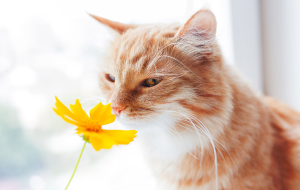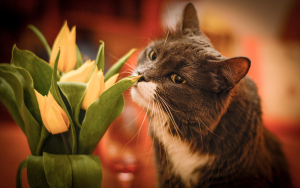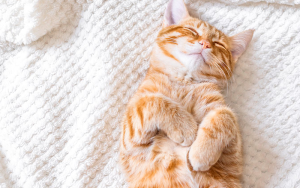What Human Food Can Cats Eat? A Guide to Safe and Nutritious Options

Introduction
Cats, as obligate carnivores, have evolved to thrive on a diet primarily composed of meat. Their unique physiological makeup demands specific nutrients that are most abundantly found in animal-based sources. However, this doesn’t mean that human food
has no place in their diet. In fact, when chosen carefully and served in moderation, certain human foods can offer supplemental nutrition and variety to our feline friends. But it’s crucial to tread with caution, as some common human edibles can be
downright dangerous for cats. In this comprehensive guide, we’ll explore the safe and nutritious human foods that can be incorporated into a cat’s diet, as well as those that should be strictly avoided.
Meat – Based Foods
Cooked Chicken
- Benefits: Cooked chicken is a nutritional powerhouse for cats. High-quality protein is the cornerstone of a cat’s diet, and chicken provides it in abundance.
Protein is essential for maintaining muscle mass, which is vital for their active lifestyle, whether it’s pouncing on toys or climbing furniture. It also plays a crucial role in bolstering the immune system, helping cats fend off diseases. Additionally,
the energy derived from protein keeps them sprightly throughout the day.
- Preparation and Serving: When preparing chicken for your cat, simplicity is key. The chicken should be plain, devoid of any seasonings that could be harmful,
such as onions, garlic, or excessive salt. These additives can lead to serious health issues, including anemia and kidney problems. Opt for cooking methods like boiling, baking, or grilling to ensure the chicken is thoroughly cooked. Once cooked,
cut it into small, bite-sized pieces. A small-sized cat, say around 5 – 8 pounds, might enjoy a teaspoon-sized portion of cooked chicken a few times a week. This serves as a delectable treat while also providing a nutritional boost.
Cooked Turkey
- Benefits: Much like chicken, cooked turkey is an excellent source of protein. It can offer a change of flavor, preventing mealtime monotony. Moreover, turkey
contains tryptophan, an amino acid that has a calming effect on some cats. This can be particularly useful during stressful situations like visits to the veterinarian or when there are changes in the household environment.
- Preparation and Serving: Ensure the turkey is well-cooked and free of bones and skin. The skin can be overly fatty, leading to weight gain and potential
pancreatitis in cats. Similar to chicken, it should be unseasoned. Cut it into small pieces and offer it to your cat in moderation. A general guideline is to limit it to about 10 – 15% of your cat’s daily caloric intake from treats. So, for an
average-sized cat consuming around 200 – 250 calories a day from food, the turkey treat portion should be calculated accordingly.
Fish
- Benefits: Fish, especially varieties like tuna and salmon, are rich in omega-3 fatty acids. These fatty acids are a boon for a cat’s skin and coat health.
They reduce inflammation, which can be beneficial for cats with itchy skin or allergies. The result is a lustrous, healthy-looking fur that owners love to stroke. Additionally, fish provides a good source of protein, further contributing to overall
health.
- Preparation and Serving: Canned tuna in water (not oil) can be given to cats, but sparingly. Tuna should not dominate a cat’s diet as it may lack some essential
nutrients and can contain mercury, which can accumulate in a cat’s body over time. For salmon, cooked salmon without any added seasonings is preferable. A small amount, such as a tablespoon of cooked salmon once or twice a week, can be a nice
treat. You can flake the salmon and mix it with a bit of your cat’s regular food to make it more enticing.
Dairy – Related Foods
Plain Yogurt
- Benefits: Plain yogurt contains beneficial bacteria known as probiotics. These microscopic allies can work wonders for your cat’s digestive health. They
help maintain a healthy balance of gut flora, potentially reducing issues like diarrhea or constipation. The calcium and protein in yogurt also offer some nutritional value, contributing to strong bones and muscles.
- Preparation and Serving: It’s of utmost importance to choose plain, unsweetened yogurt. Sweetened yogurts often contain added sugars, artificial flavors,
or fruits that can be harmful to cats. A small amount, like a teaspoon or two, can be given to your cat a few times a week. Some cats may not tolerate dairy well due to lactose intolerance, so keep a close eye for any signs of an upset stomach,
such as vomiting or loose stools.
Vegetables and Fruits
Pumpkin
- Benefits: Canned pumpkin (not pumpkin pie filling) is a godsend for a cat’s digestion. It’s a rich source of fiber, which can be a real lifesaver if your
cat is suffering from constipation or diarrhea. The fiber adds bulk to the stool, helping regulate bowel movements and bringing relief to your furry friend.
- Preparation and Serving: You can offer a small amount of plain canned pumpkin to your cat. Start with a teaspoon and gradually increase if needed, depending
on your cat’s response. It’s usually given as a short-term solution to digestive problems. You can mix it with a little bit of water to make it easier for your cat to consume.
Blueberries
- Benefits: Blueberries are tiny powerhouses of nutrition. Rich in antioxidants, vitamins, and fiber, they offer multiple benefits. Antioxidants help protect
your cat’s cells from damage caused by free radicals, which can contribute to aging and various diseases. The vitamins and fiber also support overall health, promoting good digestion and a strong immune system.
- Preparation and Serving: Wash the blueberries thoroughly to remove any pesticides or dirt. Offer a few (about 2 – 3) to your cat as an occasional treat.
Some cats may take to them immediately, while others may need some coaxing. You can crush them slightly to release the flavor if your cat seems hesitant.
Grains
Cooked Rice
- Benefits: Cooked rice, especially brown rice, is a good source of carbohydrates. It can provide a steady source of energy, which is useful for cats, especially
those that are more active. In addition, the bland nature of rice can be soothing to the digestive tract, making it beneficial if your cat has an upset stomach. It can be used in combination with other foods to help with digestive issues or as
a filler in home-made cat food recipes.
- Preparation and Serving: Plain, cooked rice can be offered to your cat. A small amount, such as a tablespoon or two, can be given. If your cat has an upset
stomach, you can cook the rice until it’s very soft and mix it with a bit of boiled chicken and pumpkin to create a nourishing meal.
Foods to Avoid
It’s equally important to be aware of the human foods that are toxic to cats. Onions and garlic, whether in raw or cooked form, can cause severe anemia in cats. Chocolate contains theobromine and caffeine, which can lead to heart problems, hyperactivity,
and even death. Caffeine, found in coffee, tea, and some sodas, has similar effects. Alcohol can cause liver damage and intoxication symptoms in cats. Grapes and raisins have been known to cause kidney failure in cats, although the exact mechanism
is still not fully understood. These substances should never be given to cats, even in small amounts.
Conclusion
While cats have specific dietary requirements as obligate carnivores, there are indeed some human foods that can be a healthy and enjoyable addition to their diet when given in moderation. Always introduce new foods slowly and monitor your cat for any
signs of an adverse reaction. If you’re unsure about a particular food, it’s best to consult your veterinarian. By being vigilant and informed about what human foods are safe and beneficial for cats, you can enhance your feline companion’s diet, providing
them with a more diverse and potentially nutritious array of options. This not only satisfies their taste buds but also contributes to their long-term health and well-being. Remember, a well-fed cat is a happy cat, and with the right choices, you
can ensure they lead a healthy and fulfilling life.







